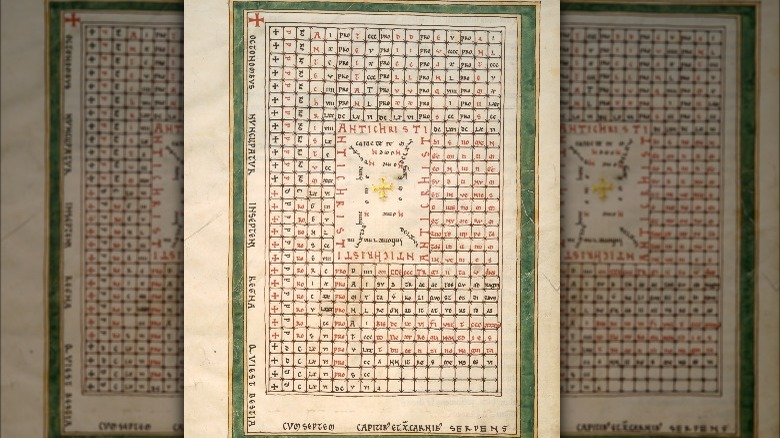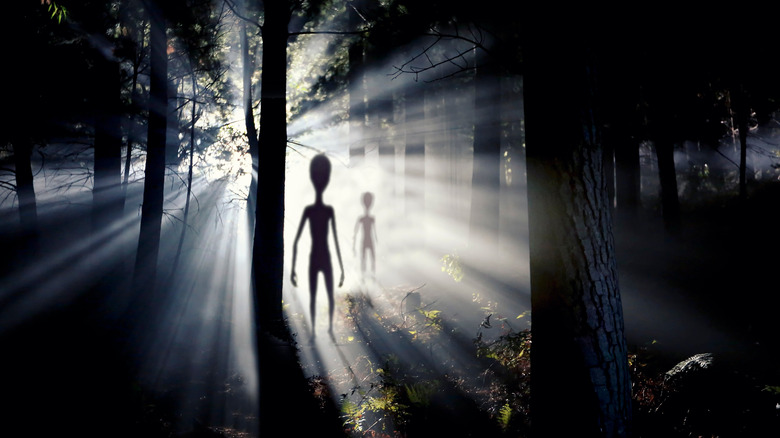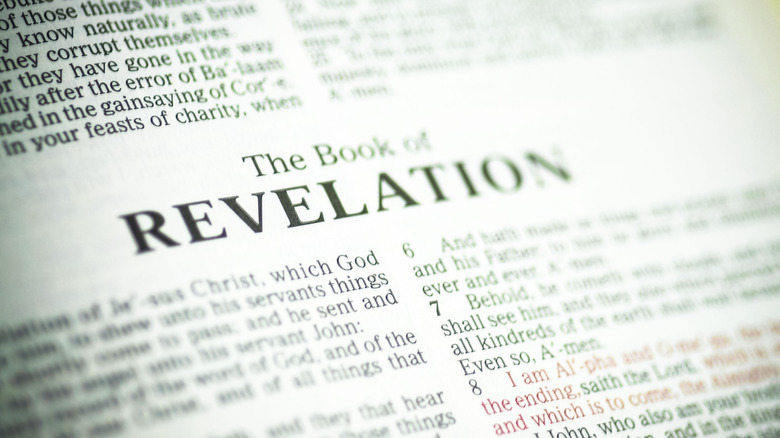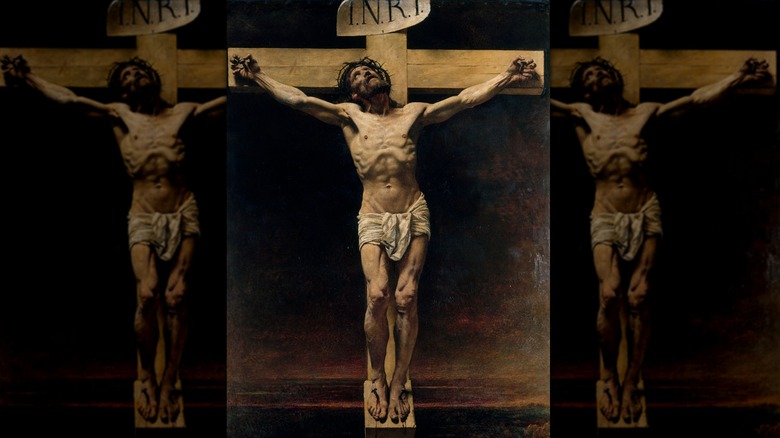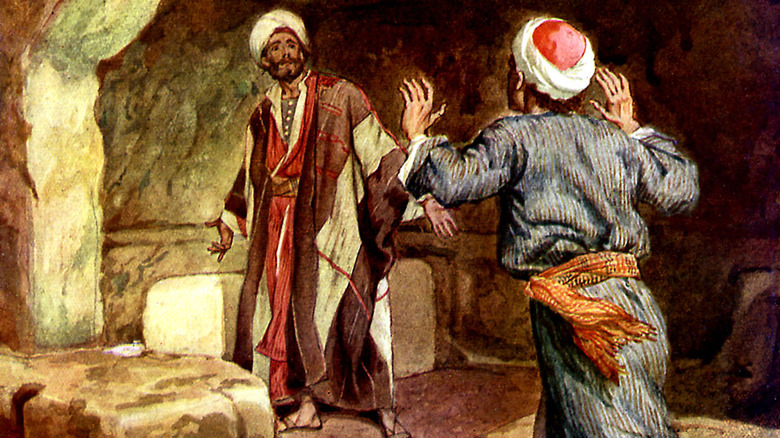The Weirdest Conspiracy Theories About The Bible
Considered holy by several of the world's biggest religions — including Christianity, Islam, and Judaism — the Bible has millions of adherents worldwide who look to it for spiritual guidance. But of course, not all believers interpret the Bible in the same way. Both Christian and Jewish believers accept the earlier books of the Bible — the Old Testament and the Hebrew Bible in Christianity and Judaism, respectively — as the word of God. However, the two religions differ on the New Testament, or Christian Bible, which Judaism does not consider sacred. Judaism does not teach that Jesus Christ was the Son of God as Christianity does, while Islam differs from Christianity and Judaism in teaching that Jesus was a prophet — one of God's five elite messengers. Aside from these major differences, there are a plethora of more fringe beliefs and interpretations, some of which belong firmly in fringe-conspiracy territory.
While Biblical scholars of all faiths quibble over the finer details, debating potential errors in translation in the story of Adam and Eve and the origins of God's portrayal, for example, others have taken more esoteric standpoints. From apocalyptic predictions to Jesus Christ's love life to everything being just one big celestial simulation, the Bible has been a fertile source of speculation. Here are some of the strangest Bible conspiracy theories out there.
The Christ myth theory
Numerous world religions attest to the existence of a historical figure called Jesus Christ, even if his relationship to God is contested among different believers. Even within Christianity alone, there are those — such as Catholics — who attest that Jesus is God as part of the Holy Trinity. Meanwhile, other denominations, such as Jehovah's Witnesses, do not. But for more than a century, another fringe theory about Jesus Christ that is particularly popular among atheists has taken hold: He never existed at all and is nothing more than a myth that got out of hand.
It isn't difficult to work out why some secularists would be happy to whitewash Jesus Christ himself from history. After all, without Christ, the largest religion in the world would be left without a core figure. But whether Jesus actually existed is rarely questioned by mainstream academics, thanks to the great number of contemporary writings that reference him. Aside from the gospels, Roman politicians such as Tacitus recall Jesus' crucifixion, while even pagan chroniclers who reviled Jesus and his followers seemingly never doubted that he was a real-life figure — even if they challenged his divinity.
The Antichrist walks among us
Many Christians believe that the Bible tells us directly what the end of the world will look like, and what events will take place in the run-up to its destruction. One of these preliminary events is the emergence of a figure known as the "Antichrist," who is prophesied in the Gospel according to its author, John. Revelation similarly describes the arrival of a "beast" who will rule over the world before the return of Christ, which many theologians take to also be a reference to the Antichrist.
The Antichrist is the pure evil opposite of Jesus Christ. Where Jesus is perfectly good, the Antichrist is perfectly bad; the son of the Devil as opposed to the son of God. As such, throughout history, numerous public figures have been identified by their political enemies as the Antichrist. Most recently, Antichrist watchers have at various points claimed that Barack Obama, Donald Trump, and Vladimir Putin fit the bill as bringers of the apocalypse. However, none of these figures have sprouted the "ten horns and seven heads" that the Book of Revelation assures us the Antichrist will grow upon arrival.
The Bible is a code
Most believers arguably choose to take the Bible at face value, and most scholars base their readings on the words of the Bible as encountered on the page. However, there is a long tradition in both Judaism and Christianity of investigating the text in yet another way: as a divine code ready to be broken.
Historical figures such as Isaac Newton — who was both a mathematician and devout Christian — turned their analytical abilities to identifying "Biblical codes" that might indicate the exact timing of the end of the world. More recently, the 1990s saw a group of Jewish theologians present their belief that the Bible could be decoded using a system of "equidistant letter sequences," to show that the text was preloaded with hidden data concerning the lives of rabbis who lived hundreds of years after the book's composition. Such experiments have been widely challenged by mainstream religious scholars, but modern computers allow attempts to decode the Bible in such a way to continue, and so this theory is not going away any time soon.
God and the angels were aliens
Belief in extraterrestrial life has boomed in recent times, with more people than ever open to the idea that aliens may be a real scientific possibility. In fact, a 2021 study released by Pew Research Center revealed that nowadays, a majority of Americans believe that life exists beyond planet Earth. So it's no surprise that some people now argue that biblical visitors to Earth — such as angels, Jesus, and even God himself — could be explained as extraterrestrial beings from another planet; perhaps even being aliens who seeded human life.
Pastor Barry Downing, author of the book "Biblical UFO Revelations," has long believed that the existence of aliens can easily be reconciled with the Christian faith, claiming (via PressConnects): "Maybe the angels were ETs or aliens in our understanding all along, but they wouldn't use that language in biblical times. The biblical people were way pre-space age. So, to solve the problem is how do we translate or interpret the Bible?" Downing argues that the whole of the Book of Exodus can be interpreted as a story of alien visitation, that the parting of the Red Sea and the book's "pillar of fire" may be explained as ancient instances of extraterrestrial technology. However, his ideas remain a fringe theory and have attracted little in the way of theological consensus.
The Earth is going to explode
One of the major differences between Christian and Jewish beliefs involves the end times: While both have apocalyptic teachings, Christians believe that the end of the world has been prophesied as a necessary part of the return of Jesus Christ. As such, apocalyptic thinking emerges in numerous forms of Christianity, with individuals of all stripes occasionally making public their belief that the end of the world is finally upon us.
Pastor Paul Begley made the headlines in 2020 when he predicted that the world would end on his birthday — December 21 that year, to be specific. People claiming to know the date of the apocalypse isn't exactly new, but what made Begley's prediction so noteworthy was his belief that the Earth itself was due to explode.
In a video shared by the Daily Express, Begley claims that evidence of earthly combustion may be found in 2 Peter 3, which contains the passage (via Bible Gateway): "But the day of the Lord will come as a thief in the night; in the which the heavens shall pass away with a great noise, and the elements shall melt with fervent heat, the earth also and the works that are therein shall be burned up." Of course, Begley's prediction did not come true, and he now predicts that the apocalypse will come sometime between 2060 and 2090.
The Church suppressed evidence of reincarnation
Just what the Bible says about the afterlife is up for debate. Neither the Old Testament nor Jesus himself had much to say about what happens when you die. The conception of the soul, its relation to the body, and whether it ascends to a spiritual plane or awaits physical resurrection are all ideas that evolved over the centuries, and today, the Abrahamic faiths have differing views from another and within themselves. But there is a broad consensus in Jewish, Christian, and Muslim thought that our individual souls do have an existence after this life, one that sees our souls and our identities carry on.
This puts the Abrahamic tradition at odds with religions that believe in reincarnation, the idea that a spirit moves from one physical life to another. It's a divide that some believe came from a conspiracy of suppression. Some New Age believers claim that the Council of Nicaea removed biblical teachings supporting reincarnation in 553 AD. The idea has picked up support among theologians, philosophers, and some practicing Christians in Eastern countries. For evidence, believers have cited the condemned writings of Origen, who believed that souls had a spiritual existence before physical birth, and certain canon passages about John the Baptist interpreted as saying he is the reincarnation of Elijah.
At issue for believers in this conspiracy — for a start — is that there was no Nicaean council in 553. The Second Ecumenical Council was held in Constantinople that year, but it made no decisions on reincarnation. And Origen, whatever New Age adherents have read into his work, was heavily critical of reincarnation.
Jesus and Mary Magdalene were lovers
Even in this age of ubiquitous mass communication, which lets conspiracy theories spread like never before, many Biblical conspiracies haven't found their way into common knowledge. Not so with the theory that Jesus Christ slept with Mary Magdalene. It's at the heart of "The Da Vinci Code," one of the most popular and controversial fiction novels of the early 2000s. But the belief that Jesus and Mary Magdalene were lovers existed well before Dan Brown put pen to paper.
Gnostic gospels have been interpreted as suggesting that Magdalene was a leader in the early church and a rival to Peter. Some experts have turned to the Bible itself and see in the New Testament evidence of an intimate relationship between Magdalene and Jesus. And the realities of Jewish life in that era make Jesus having a partner more believable; it was the norm for Jewish men and rabbis to take a wife. From that claim, variant conspiracies have spread, including one that holds that Magdalene fled to France, had a daughter, and so introduced Jesus's bloodline into the French royal family and the wider world. The daughter, as related in "The Da Vinci Code," is the true Holy Grail.
Evidence for any piece of this theory is thin, as multiple scholars said at the time "The Da Vinci Code's" film adaptation was released. Some have even gone so far as to use it as a perfect example of conspiratorial thinking and falling education standards.
The Book of Revelation predicts restrictions on religious freedom
The Book of Revelation is a work of literature in an apocalyptic genre that was popular for centuries before the birth of Jesus. The dominant view on the book among Christian denominations is that it was concerned with persecution by early Christians in the Roman world, during the first century A.D., albeit with provisos allowing it to function both as historical literature and prophecy on a limited scale. The idea that Revelation is first and foremost a literal foretelling is comparatively modern, and distinctly Anglo-American Protestant.
Besides the end of the world and the final judgment of God, Revelation, specifically Revelation 13, has been said to predict a time when America's freedom of religion would come under attack. The beast with two horns in 13:11 is assumed to be America in this theory, with the two horns representing civic and religious freedoms guaranteed under the Constitution. Some believers saw a fulfillment of this supposed prophecy during the COVID-19 pandemic. The temporary restrictions placed on religious gatherings were taken as an assault on freedom, and some even likened vaccination to the enforced branding of the number of the beast mentioned at the end of Revelation 13.
Adrian Petre of St. Network included this conspiracy theory in a trend he described as "prophetic populism," which he blamed for the January 6 insurrection. Petre further tied conspiratorial thinking in general to a Christian worldview, insofar as both posit a struggle between good and evil where evil must be overcome through one true set of facts. He advised biblical knowledge and critical reasoning as the antidote to conspiracism.
The deicide of the Jews
It's one of the oldest and most tragically consequential conspiracy theories in history: the charge that the Jewish people were responsible for the death of Jesus Christ, and will shoulder that guilt throughout eternity. It's a myth built on the Gospel of Matthew, when Pontius Pilate moved to pardon a prisoner "chosen by the crowd," and the priests and elders of the Jewish community led a demand for Jesus's crucifixion, crying, "His blood is on us and on our children!" As Matthew has it, Pilate literally washed his hands of the affair, pardoned a criminal instead, and gave Jesus over for execution.
Never mind that expanding the priests' cries to include the whole of Jewry is a stretch, to put it mildly. Never mind that Christianity only emerged as a distinct religion from Judaism after Jesus's death, and that Jesus was probably not perceived as particularly subversive within the Jewish community in his lifetime. And never mind that many Christian authorities, including a general convention of the Episcopal church and multiple popes, have rejected and denounced the charge of deicide against the Jewish people. The belief that they have has lingered through millennia, and it's been used to justify persecution and atrocities since the third century.
Per the Anti-Defamation League, additional conspiracy theories have been spun off from the deicide myth, such as the idea that Jews go about spoiling the Eucharist. Within some Muslim circles, despite the Qur'an rejecting the idea that the Jewish people killed Jesus, a variant conspiracy has still persisted. This one accuses Jews of broadly targeting prophets for murder.
The disciples stole Jesus's body
The New Testament holds a conspiracy theory in plain view. The Gospel of Matthew says that when the tomb of Jesus was found empty after his crucifixion, the priests and elders of Jerusalem conspired with soldiers guarding the cemetery to discredit his resurrection. The soldiers were paid to say that the disciples of Jesus stole his body from its grave.
The allegation of grave robbing is presented in Matthew as a deliberate and false scheme, but the stolen body hypothesis, as the theory is known, has been embraced by some. However, the details of these newer theories don't always align with the description in the Bible. Charles Freeman proposed in his "A New History of Early Christianity" that Caiaphas, high priest of Israel, stole Jesus' body away and engineered the claim of resurrection to try and quell civic unrest following the crucifixion. For supporting evidence, Freeman cites the Gospel of Peter, a non-canonical book that mentions two men entering the tomb and three emerging, possibly an eyewitness account of the body being borne away.
Richard Carrier likewise gave credibility to the stolen body hypothesis in "The Empty Tomb: Jesus Beyond the Grave," if only as a plausible alternative to his favored assumption that the empty tomb story was a myth. Against such arguments, religious commentators have pointed out the lack of consequence for the guards and the brutal reality of the disciples' lives for sticking to their story about Jesus.
The Bible Simulation Theory
You've probably encountered the simulation theory through science fiction or popular science writing. But the idea that our experience of reality isn't true is an old one. Rene Descartes proposed a variation on it. Plato's "Allegory of the Cave" discusses it. And it's been proposed through a religious lens as well. Some have pointed out that biblical teaching implies that there is a greater reality beyond physical existence, and that God stands apart from the material world — not unlike proposals for a sufficiently advanced technology to engineer a simulated reality.
One student's expression of simulation theory got under the skin of Professor Gregory J. Rummo, who wrote in the Christian Scholars' Review that he struggled to argue against his student's claim. Accepting the divinity of Jesus, as Rummo does, meant accepting him as a "trans-dimensional being" who defied natural laws. And it means accepting that the world does not exist as originally intended, and that it is destined to be transformed at the Second Coming.
The irony is that many who accept secular versions of simulation theory reject religion, supernatural powers, and life after death. But Rummo used his musings on simulation theory to argue for a collaborative and harmonious relationship between faith and science in puzzling out the universe as we perceive it. On the secular end, he said that meant entertaining the possibility of a spiritual simulation, albeit a benign and transformative one, rather than a technologically engineered one.



